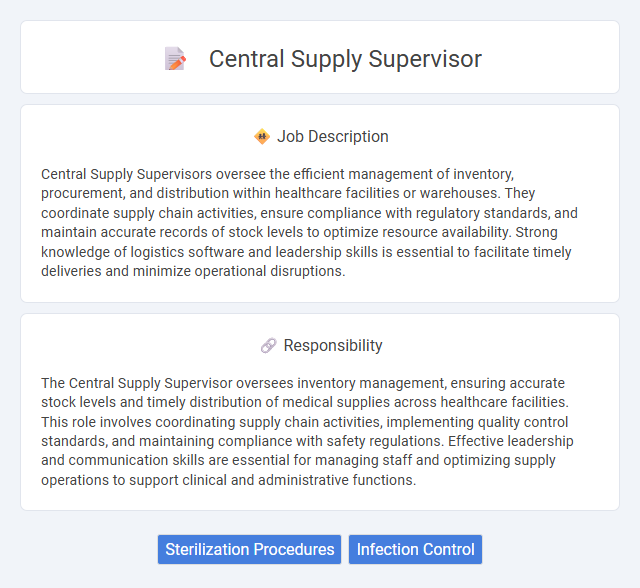
Central Supply Supervisors oversee the efficient management of inventory, procurement, and distribution within healthcare facilities or warehouses. They coordinate supply chain activities, ensure compliance with regulatory standards, and maintain accurate records of stock levels to optimize resource availability. Strong knowledge of logistics software and leadership skills is essential to facilitate timely deliveries and minimize operational disruptions.
Individuals with strong organizational skills and attention to detail will likely be suitable for a Central Supply Supervisor role, as managing inventory and coordinating supplies requires meticulous oversight. Those who thrive under pressure and possess effective communication abilities may have a higher probability of success, given the need to liaise between departments and handle urgent demands. Conversely, people who struggle with multitasking or lack initiative could find this position less ideal, as it demands proactive problem-solving and dynamic resource management.
Qualification
A Central Supply Supervisor typically requires a bachelor's degree in supply chain management, logistics, or a related field, along with several years of experience in inventory control and warehouse operations. Proficiency in supply chain software, strong analytical skills, and knowledge of regulatory compliance standards are essential qualifications. Leadership abilities and effective communication skills are critical for managing teams and coordinating with multiple departments.
Responsibility
The Central Supply Supervisor oversees inventory management, ensuring accurate stock levels and timely distribution of medical supplies across healthcare facilities. This role involves coordinating supply chain activities, implementing quality control standards, and maintaining compliance with safety regulations. Effective leadership and communication skills are essential for managing staff and optimizing supply operations to support clinical and administrative functions.
Benefit
A Central Supply Supervisor will likely enjoy benefits such as enhanced career advancement opportunities and skill development in inventory and logistics management. The role probably offers a structured work environment with stable hours and potential for earning bonuses based on performance. Employees in this position may also access comprehensive health benefits and retirement plans, contributing to long-term job satisfaction and security.
Challenge
The Central Supply Supervisor role likely involves managing complex inventory systems and ensuring timely distribution, which can present significant logistical challenges. Handling unpredictable supply chain disruptions and coordinating among multiple departments may test problem-solving skills and adaptability. There is a probable need for maintaining accuracy in stock control while optimizing resource allocation under pressure.
Career Advancement
The Central Supply Supervisor plays a critical role in overseeing inventory management and coordinating supply chain operations within healthcare facilities, ensuring efficient resource allocation. Mastery of logistics software, team leadership, and compliance with regulatory standards significantly enhances opportunities for promotion to roles like Logistics Manager or Operations Director. Continuous professional development and certifications such as Certified Supply Chain Professional (CSCP) can accelerate career growth and increase earning potential.
Key Terms
Sterilization Procedures
Central Supply Supervisors ensure strict adherence to sterilization procedures, maintaining hospital instruments' sterility to prevent infections. They oversee the proper cleaning, disinfection, packaging, and sterilization processes using autoclaves and chemical sterilants, complying with established healthcare standards. This role requires rigorous monitoring and documentation to guarantee the effectiveness of sterilization cycles and compliance with regulatory guidelines.
Infection Control
Central Supply Supervisors play a critical role in maintaining infection control by ensuring sterilization and proper handling of medical instruments and supplies. They implement strict protocols for cleaning, disinfecting, and storage to prevent contamination and healthcare-associated infections. Their oversight guarantees compliance with regulatory standards such as OSHA and CDC guidelines, promoting patient safety across healthcare facilities.
 kuljobs.com
kuljobs.com